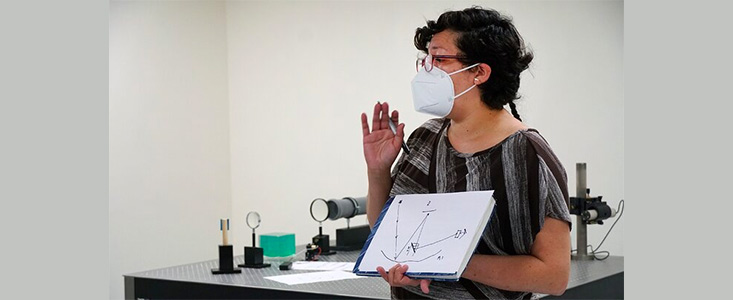Anuncio
ESO celebra el Día Internacional de la Mujer y la Niña en la Ciencia 2022
11 de Febrero de 2022
Hoy es el Día Internacional de la Mujer y la Niña en la Ciencia, celebración proclamada por las Naciones Unidas. Este día se instauró con la idea de promover un acceso igualitario a la ciencia para las mujeres y las niñas como un recordatorio del papel fundamental que cumplen en las comunidades científicas y tecnológicas, y lo importante que es promover su participación. ESO ha dado pasos importantes hacia la diversidad y la inclusión de todos los géneros, incluido el año pasado, y por lo mismo vamos a dedicar una semana de actividades para celebrar este día.
En octubre de 2021, como parte del acuerdo entre ESO y UN Women firmado en 2020, ESO comenzó a participar en el programa Tu Oportunidad (programa Second Chance) en Chile. En asociación con UN Women, ESO empezó a capacitar a siete mujeres radicadas en Chile en aspectos técnicos clave para la astronomía, como el revestimiento de los espejos telescópicos grandes, lo cual les permitirá ampliar sus oportunidades laborales y asimilar las capacidades para trabajar en los mejores observatorios astronómicos. Además, varios colegas de ESO en Chile se han unido a un proyecto de orientación, LIQCAU, a cargo de las universidades de Antofagasta, el cual pretende aumentar la participación de las mujeres en ciencia, tecnología, ingeniería y matemáticas (STEM).
ESO siempre está buscando formas de abordar la diversidad y la inclusión en un sentido más amplio, en línea con los Objetivos de Desarrollo Sostenible de las Naciones Unidas, uno de los cuales es “lograr la igualdad entre los géneros y empoderar a todas las mujeres y las niñas”. Por ejemplo, ESO ha promovido la participación de astrónomas en los paneles que evalúan las propuestas de observación para los telescopios ESO, con lo cual hace poco se logró un equilibrio de género en su composición. Además, ESO es miembro de la red GENERA, la cual apunta a promover la colaboración en política de igualdad de géneros en el campo de la física entre organizaciones de investigación, asociaciones y consorcios de todo el mundo, así como en comunidades y proyectos de física establecidos internacionalmente.
A fin de inspirar a mujeres y niñas para que sigan una carrera científica, esta semana estamos destacando diversas funciones y carreras de mujeres en ESO en el ESOblog. También hemos estado mostrando el trabajo día a día de astrónomas e ingenieras en nuestras redes sociales.
Además, se invitó a los hijos del personal de ESO y de sus amigos y familiares a ponerse creativos y participar de la celebración en el EIROforum del Día Internacional de la Mujer y la Niña en la Ciencia enviando un dibujo sobre el tema Mujeres en la ciencia. EIROforum, del cual ESO es fundador, es el foro de la Organización Europea de Investigación Intergubernamental y reúne a ocho de las organizaciones de investigación más grandes de Europa.
Asimismo, para celebrar a las mujeres en la astronomía, el ESO Supernova Planetarium & Visitor Centre en Garching, Alemania, está llevando a cabo una conversación pública en línea sobre exoplanetas organizada por el vecino Max Planck Institute for Extraterrestrial Physics.
Conforme ESO mira al futuro, revisaremos constantemente nuestros procedimientos, incluido el proceso de contratación y desarrollo profesional, para garantizar que sea lo más imparcial posible. En particular, deseamos aumentar la visibilidad de ESO ante las ingenieras jóvenes manteniendo un contacto estrecho con la Society of Women Engineers, por ejemplo. ESO también está preparando un Plan de Diversidad, Equidad e Inclusión con el fin de atraer mano de obra más diversa y seguir promoviendo y haciendo posible un ambiente para todos, en especial para las mujeres.
Enlaces
- Dibujos enviados por hijos del personal de ESO y de sus familiares y amigos sobre el tema Mujeres en la ciencia (archivo PDF, 34,2 MB)
Contactos
Francesca Primas
ESO
Garching bei München, Germany
Tel: +49 89 3200 6797
Email: fprimas@eso.org
Michèle Peron
ESO
Garching bei München, Germany
Tel: +49 89 3200 6431
Email: mperon@eso.org
Bárbara Ferreira
ESO Media Manager
Garching bei München, Germany
Tel: +49 89 3200 6670
Email: press@eso.org
Sobre el anuncio
| Identificador: | ann22003 |

